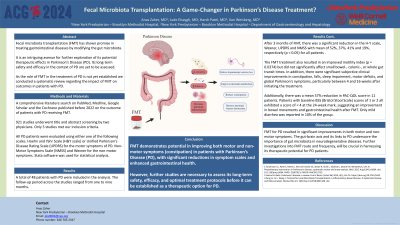Sunday Poster Session
Category: Colon
P0221 - Fecal Microbiota Transplantation: A Game-Changer in Parkinson’s Disease Treatment?
Sunday, October 27, 2024
3:30 PM - 7:00 PM ET
Location: Exhibit Hall E

Has Audio
- AZ
Anas Zaher, MD
New York-Presbyterian / Brooklyn Methodist Hospital
Brooklyn, NY
Presenting Author(s)
Anas Zaher, MD1, Harsh Patel, MD1, Ilan Weisberg, MD2
1New York-Presbyterian / Brooklyn Methodist Hospital, Brooklyn, NY; 2New York-Presbyterian Brooklyn Methodist Hospital, Brooklyn, NY
Introduction: Fecal microbiota transplantation (FMT) has shown promise in treating gastrointestinal diseases by modifying the gut microbiota. It is an intriguing avenue for further exploration of its potential therapeutic effects in Parkinson’s Disease (PD). Its long-term safety and efficacy in the context of PD are yet to be assessed. As the role of FMT in the treatment of PD is not yet established we conducted a systematic review regarding the impact of FMT on outcomes in patients with PD.
Methods: A comprehensive literature search on PubMed, Medline, Google Scholar and the Cochrane published before 2022 on the outcome of patients with PD recieving FMT. 921 studies underwent title and abstract screening by two physicians. Only 5 studies met our inclusion criteria. All PD patients were evaluated using either one of the following scales. Hoehn and Yahr Scale (H&Y scale) or Unified Parkinson's Disease Rating Scale (UPDRS) for the motor symptoms of PD. Non-Motor Symptoms Scale (NMSS) and Wexner for the non-motor symptoms. Stata software was used for statistical analysis.
Results: A total of 48 patients with PD were included in the analysis. The follow-up period across the studies ranged from one to nine months. After 3 months of FMT, there was a significant reduction in the H-Y scale, Wexner, UPDRS and NMSS with mean of 52%, 37%, 41% and 19%, respectively (p < 0.05) for all patients . The FMT treatment also resulted in an improved motility index (p = 0.0374) but did not significantly affect small bowel-, colonic-, or whole gut transit times. In addition, there were significant subjective clinical improvements in constipation, falls, sleep impairment, motor deficits, and global Parkinson's symptoms, particularly between 4 and 16 weeks after initiating the treatment. Additionally, there was a mean 57% reduction in PAC-QOL score in 11 patients. Patients with baseline BSS (Bristol Stool Scale) scores of 1 or 2 all exhibited a score of < 4 at the 24-week mark, suggesting an improvement in bowel movements and gastrointestinal health after FMT. Only mild diarrhea was reported in 10% of the group.
Discussion: FMT for PD resulted in significant improvements in both motor and non-motor symptoms. The gut-brain axis and its links to PD underscore the importance of gut microbiota in neurodegenerative diseases. Further investigations into FMT route and frequency, will be crucial in harnessing its therapeutic potential for PD patients.
Disclosures:
Anas Zaher, MD1, Harsh Patel, MD1, Ilan Weisberg, MD2. P0221 - Fecal Microbiota Transplantation: A Game-Changer in Parkinson’s Disease Treatment?, ACG 2024 Annual Scientific Meeting Abstracts. Philadelphia, PA: American College of Gastroenterology.
1New York-Presbyterian / Brooklyn Methodist Hospital, Brooklyn, NY; 2New York-Presbyterian Brooklyn Methodist Hospital, Brooklyn, NY
Introduction: Fecal microbiota transplantation (FMT) has shown promise in treating gastrointestinal diseases by modifying the gut microbiota. It is an intriguing avenue for further exploration of its potential therapeutic effects in Parkinson’s Disease (PD). Its long-term safety and efficacy in the context of PD are yet to be assessed. As the role of FMT in the treatment of PD is not yet established we conducted a systematic review regarding the impact of FMT on outcomes in patients with PD.
Methods: A comprehensive literature search on PubMed, Medline, Google Scholar and the Cochrane published before 2022 on the outcome of patients with PD recieving FMT. 921 studies underwent title and abstract screening by two physicians. Only 5 studies met our inclusion criteria. All PD patients were evaluated using either one of the following scales. Hoehn and Yahr Scale (H&Y scale) or Unified Parkinson's Disease Rating Scale (UPDRS) for the motor symptoms of PD. Non-Motor Symptoms Scale (NMSS) and Wexner for the non-motor symptoms. Stata software was used for statistical analysis.
Results: A total of 48 patients with PD were included in the analysis. The follow-up period across the studies ranged from one to nine months. After 3 months of FMT, there was a significant reduction in the H-Y scale, Wexner, UPDRS and NMSS with mean of 52%, 37%, 41% and 19%, respectively (p < 0.05) for all patients . The FMT treatment also resulted in an improved motility index (p = 0.0374) but did not significantly affect small bowel-, colonic-, or whole gut transit times. In addition, there were significant subjective clinical improvements in constipation, falls, sleep impairment, motor deficits, and global Parkinson's symptoms, particularly between 4 and 16 weeks after initiating the treatment. Additionally, there was a mean 57% reduction in PAC-QOL score in 11 patients. Patients with baseline BSS (Bristol Stool Scale) scores of 1 or 2 all exhibited a score of < 4 at the 24-week mark, suggesting an improvement in bowel movements and gastrointestinal health after FMT. Only mild diarrhea was reported in 10% of the group.
Discussion: FMT for PD resulted in significant improvements in both motor and non-motor symptoms. The gut-brain axis and its links to PD underscore the importance of gut microbiota in neurodegenerative diseases. Further investigations into FMT route and frequency, will be crucial in harnessing its therapeutic potential for PD patients.
Disclosures:
Anas Zaher indicated no relevant financial relationships.
Harsh Patel indicated no relevant financial relationships.
Ilan Weisberg indicated no relevant financial relationships.
Anas Zaher, MD1, Harsh Patel, MD1, Ilan Weisberg, MD2. P0221 - Fecal Microbiota Transplantation: A Game-Changer in Parkinson’s Disease Treatment?, ACG 2024 Annual Scientific Meeting Abstracts. Philadelphia, PA: American College of Gastroenterology.
